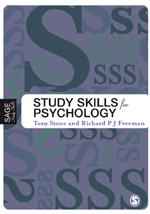|
Psychology Study SkillsPsychology Study Skills
(Photo Credit: Master Shake Signal) Thinking About Becoming A Psychology Student?
Find A Psychology School Near You
Welcome to the psychology study skills section of the website. This page is designed to help anybody currently studying or thinking about studying psychology get the most out of their course, program or degree. The following psychology study skills resources come courtesy of OpenLearn. OpenLearn is The Open University’s way of making a selection of its learning materials available free of charge on the internet to learners and educators around the world. Before accessing any of the material listed below, I strongly recommend that you register with OpenLearn. Once registered you will be able to participate in the activities associated with the learning units and receive updates from the associated unit forum. For full details Click Here to visit the Getting Started page. Learning How To LearnLearning how to learn: A process we all engage in throughout our lives, but no single method of learning guarantees success. This unit aims to make the process of learning much more explicit by inviting you to apply various ideas and activities to your own study as a way of increasing your awareness of your own learning. Most learning has to be an active process – and this is particularly true of learning how to learn. Click Here to access the learning how to learn unit. ReadingReading is an essential skill for all of us and developing our skills in reading is a good investment. This unit is packed with practical activities which are aimed at making reading more enjoyable and rewarding. This unit also includes sections on how to read actively and critically. Click Here to access the reading unit. Using A Computer For StudyThe internet is a fantastic source of information for any student, but how do you evaluate the information each site provides? This unit will help you assess the benefits of information technology, providing guidance on the protocols for using email, online conferencing and real time chat as methods of communication. Click Here to access the using a computer to study unit. Web GuideFrightened of the internet? This unit will help you make effective use of the internet, giving you the basic skills required for using web-based resources. Useful tricks and tips are provided as well as information on web browsers, the main features of a browser window, how to look at websites, using hyperlinks, searching for information on the internet, copying text, avoiding computer viruses, and using PDFs. Click Here to access the web guide unit. Revision & ExaminationsDo you get stressed at the thought of an examination? Does the idea of revision fill you with dread? This unit will provide a host of tips to help you improve your revision and examination techniques and enable you to manage your time effectively by creating a timetable for your revision. Click Here to access the revision & examinations unit. PresentationsEffective communication is the key to a successful presentation. This unit will provide you with a systematic approach to develop the necessary skills. It is important to understand that effective presentation skills can be practised and learned. It is the content of your presentation, and the simple delivery of clear and reasoned arguments, which will help you to achieve your objectives. Click Here to access the presentations unit. Extending & Developing Your Thinking SkillsDiagrams, mind-maps, tables, graphs, time lines, flow charts, sequence diagrams, decision trees: all can be used to organise thought. This unit will introduce you to a variety of thinking skills. Asking and answering questions is at the heart of high-quality thinking. Questions naturally arise from the desire to know and learn about things and may be the starting point for a journey of understanding. Click Here to access the extending and developing your thinking skills unit. Essay & Report WritingWriting reports and assignments can be a daunting prospect. This unit is designed to help you develop the skills you need to write effectively for academic purposes. You will learn how to interpret questions and how to plan, structure and write your assignment or report. Click Here to access the essay and report writing unit. Recommended Psychology Study Skills ReadingStudy Skills for Psychology: Succeeding in Your Degree by Richard Freeman & Antony Stone
Book Description Study Skills for Psychology has been shaped around a typical psychology students journey. Beginning with an overview of the nature of the degree and advice about what needs to be sorted out in the first few weeks of the course, this book tackles how to get the most from your lectures, exam preparation and project development, right through to contemplating and investigating future career options. This highly accessible psychology study skills guide is designed to help you meet the challenges and reap the rewards of your degree by introducing a range of psychology study skills and providing you with ways to practice those skills. This book should accompany you throughout your degree course as a resource that you can use whenever you need help. An essential companion for any student, Study Skills for Psychology will give you the skills to enjoy your time studying for and succeeding in your Psychology degree. See following link for more details: Study Skills for Psychology: Succeeding in Your Degree Classic Articles All Psychology Students Should Read
This special Kindle collection consists of the most influential, infamous and iconic research articles ever published in the history of psychology. See following link for full details. The Psychology Classics Kindle Collection Go From Psychology Study Skills Back To The Home Page
|


